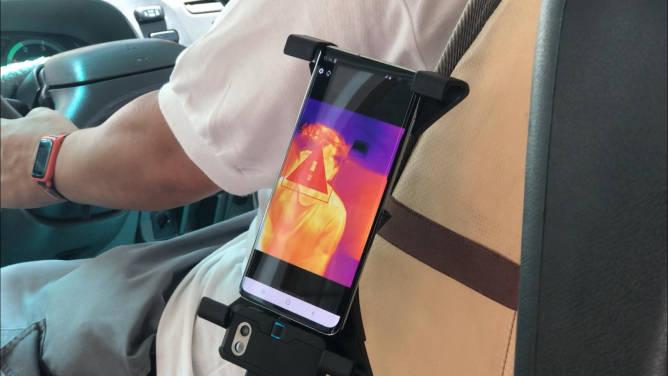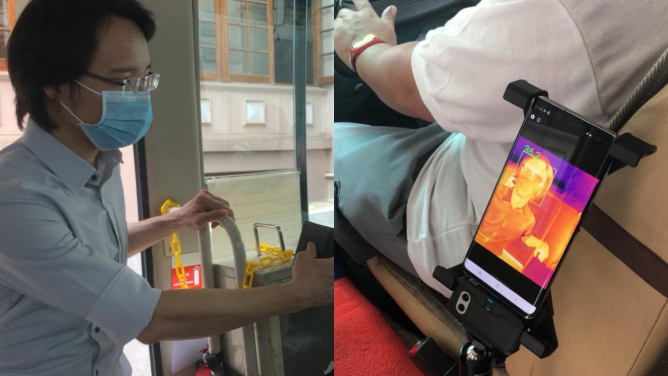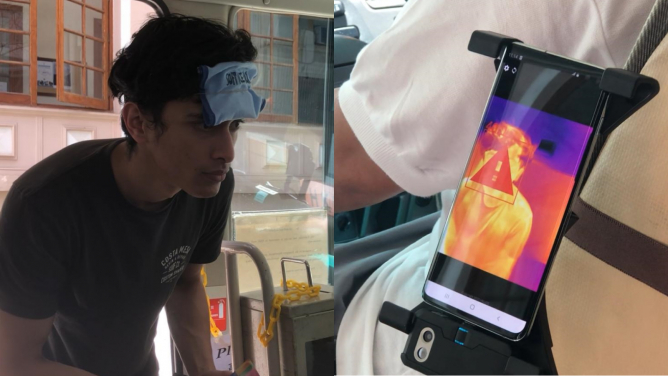Media
From technology to daily life: HKU Engineering develops handy thermography fever detection system for public transportations
14 Jun 2020

The team hopes that the portable thermography fever detection system can be applied in public transportation commonly in the future.
Thermography, also known as thermal imaging, has been developing as fever screening technology since the SARS outbreak, and is now a common tool in fighting COVID-19. It is widely used in venues such as restaurants, fitness centres, and beauty salons, etc. However, existing systems have to be connected to computer systems and require professional set up. Besides, this kind of system is yet to be seen in public transportation.
A multidisciplinary group of researchers from the Departments of Mechanical Engineering and Computer Sciences led by Dr S.C. Fu, Research Assistant Professor of the Department of Mechanical Engineering at The University of Hong Kong (HKU), has recently explored a low-cost thermography fever detection system which is portable and can be easily accessed and mastered by users. Multiple trials have been conducted at the HKU campus since early May. The research team hopes that this portable thermography fever detection system can be applied in public transportation, such as taxis, shuttle buses and minibuses commonly in the future.
Thermography uses an infrared camera to display a colorful image with thermal information. While most of the existing commercial thermography fever detection systems require a server and fixed installation, this newly-developed system is non-intrusive and portable which can be run on mobile devices such as mobile phone and tablet with a small thermal camera plugin. The thermal camera plugin in the current prototype is a commercial product which costs around HK$3,000 per set and this accounts for most of the hardware cost. Thus, as compared to other similar systems in the market, the total cost of the current prototype is far lower and the system is more handy.
Furthermore, this non-intrusive system can be used for rapid screening and singling out suspected fever cases as it uses face detection technique to identify people and automatically check the forehead temperature of multiple persons at the same time. It has successfully overcome the challenge of systems available in the market which require the thermometer to be pointed at the person’s forehead and cannot operate on multiple persons simultaneously.
“Smartphone/ tablet is a daily necessity nowadays. Just imagine how convenient it is if our smartphone can be used as a thermography fever detection system with only a small plug-in,” said Dr S.C. Fu, “the system is automated so that the driver can focus on the road, without the need to perform temperature checks on passengers manually, he explained. “To ensure personal privacy, only thermal image, instead of the face of the person, is shown on the screen,” Dr Fu further elaborated.
The accuracy of thermography technology for temperature measure highly depends on the distance between the camera and the target person; the skin condition of the person, and the environmental conditions. In the trial runs at HKU Campus which has been undergoing since early May, the group have successfully achieved a minimal error of 0.31-0.57°C by simply adjusting the environmental parameters, while existing systems require expertise support and expensive instrument for calibration in every different situation to achieve a similar accuracy.
Dr Fu added, “The best use of thermography system is to screen people quickly for singling out those with abnormal temperature. To work towards this purpose without increasing the cost of the device, we plan to further develop the system for application in specific scenarios so that distance effect, target person’s condition and environmental factors could be controlled and easily calibrated. We hope that this system can be applied in public transportation such as shuttle buses and minibuses in the near future.”
The system can also inspire STEM teaching and learning in the public, especially in secondary schools. The team plans to organise summer courses and produce videos to introduce the basic principle of the system. Students can develop their own systems after learning the technology.
The co-leader of the project, Professor Dennis Leung, Head of Department of Mechanical Engineering, remarked, “Hong Kong is a city with cutting-edge technology. In the era of information, we have a vision that people not only enjoy using new technology, but are also interested in developing their own products. We wish our mobile thermography fever detection system can be developed as a platform to promote STEM learning to the public and nurture young people to become the ‘master’ of technology.”
Media enquiries:
Ms Celia Lee, Faculty of Engineering, HKU (Tel: 3917 8519; Email: [email protected]k) or
Miss Bonnie Tsang, Faculty of Engineering, HKU (Tel: 3917 1924; Email: [email protected])


